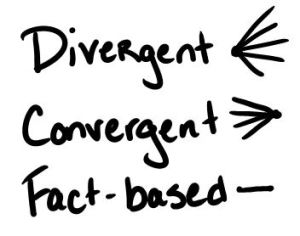These last few weeks have been a little tricky. We’ve had snow days, delayed openings, half days, and PARCC testing disrupt the usual continuity of the start of our Othello unit in my sophomore English classes. In the midst of the disruptions, the students were introduced to the Inquiry Learning Plan and developed their first essential questions. They have created questions for Socratic seminars with their first semester, substitute teacher, but for the first time, they were creating something that could help them examine multiple sources, that was philosophical in nature, and that was broad enough to garner unique responses. Before we got into PARCC testing and before they would need to read a chunk of the text on their own, I wanted them to have a grounding question that they could continually refer to as they read.
We started with a brief mini-lesson in types of questions. I borrowed definitions from Giselle Martin-Kniep for divergent, convergent, and fact-based.
I asked the students, first, what they thought the words might mean. I reminded them that they could draw from understandings in science or math classes as well as from the popular book series, Divergent, to formulate potential definitions. Students differentiated between divergent and convergent by saying that the former leads to multiple end points whereas the latter might start from multiple places that “converge” or yield to one end point. I asked them to apply that to a question, and using the symbols next to the words above, we created the common understanding that a divergent question requires someone to examine multiple resources and could have multiple responses, depending on perspective, resources, and personal experiences. Convergent questions have a specific answer that might require some analysis of resources and some careful interpretation, but no matter the perspective of the person responding, the answer is the same. Fact-based questions also have one answer, but they are more simplistic. They don’t require interpretation. Instead, these are the kinds of questions that can be answered by simply turning to a specific page. For example, if I asked who wrote the play, all students could look at the cover of the book and respond, “William Shakespeare.”
After reading Act I, I grouped students and asked them to identify thematic concepts they had seen emerging in the text so far. They listed revenge, jealousy, bravery, confidence, justice, treachery, love, betrayal, loyalty, trust, and racism. Next, each group identified two concepts that they wanted to explore further, and they wrote divergent questions for each.
Group representatives wrote their questions on the board for class review.

They shared questions like these:
- Is trust always blind?
- Is betraying your family worth it to be with the person you love?
- How do rumors affect thoughts and actions?
- Can love overpower anything or can the world and its obstacles eventually come between two people?
- Why are people susceptible to manipulation?
- Is trust in others a strength?
We then eliminated or reworked questions that were too specific to the text or that weren’t divergent. For example, the students thought the following question was too leading: “How has the value of loyalty decreased since the time period described in Othello?” Some thought it left out the possibility that the value of loyalty hasn’t decreased. They swapped out the word, “decreased” for “changed;” however, some were still not satisfied. They thought it was too specific, and they didn’t think that they could walk away with varying responses if they stuck to a compare/contrast structure. The class decided to nix it altogether.
They voted on the remaining questions, first selecting two favorites within the group (no group was allowed to vote for both of their own questions) to narrow down the selections. Finally, the groups voted on their ultimate favorite, and the question with the most votes in the class won:
When is revenge justifiable?
After the decision was made, I asked students to write down the other questions on the board that might want to explore and that will help them to answer the class question. They’re keeping those in their ILPs throughout the unit.
The class question will serve as our grounding focus as the students take control of selecting supplementary sources, studying individual standards, and developing unique activities. That will allow the whole class to come together at reflection points. This is especially important as they learn how to go through the ILP and navigate the emotions of inquiry. I’ll report back on our progress as we go!
